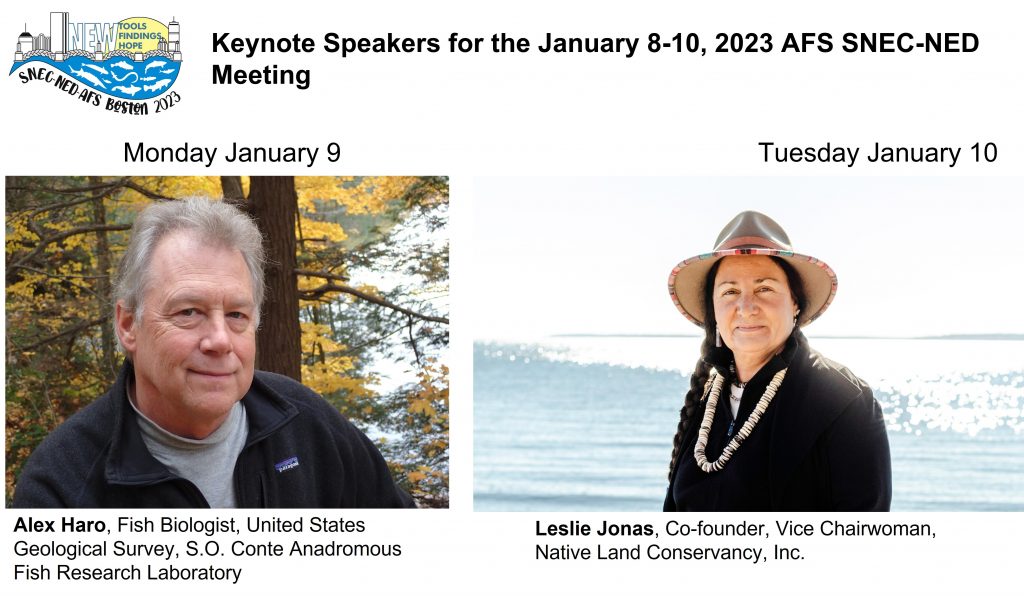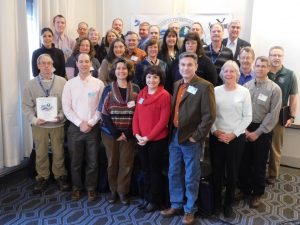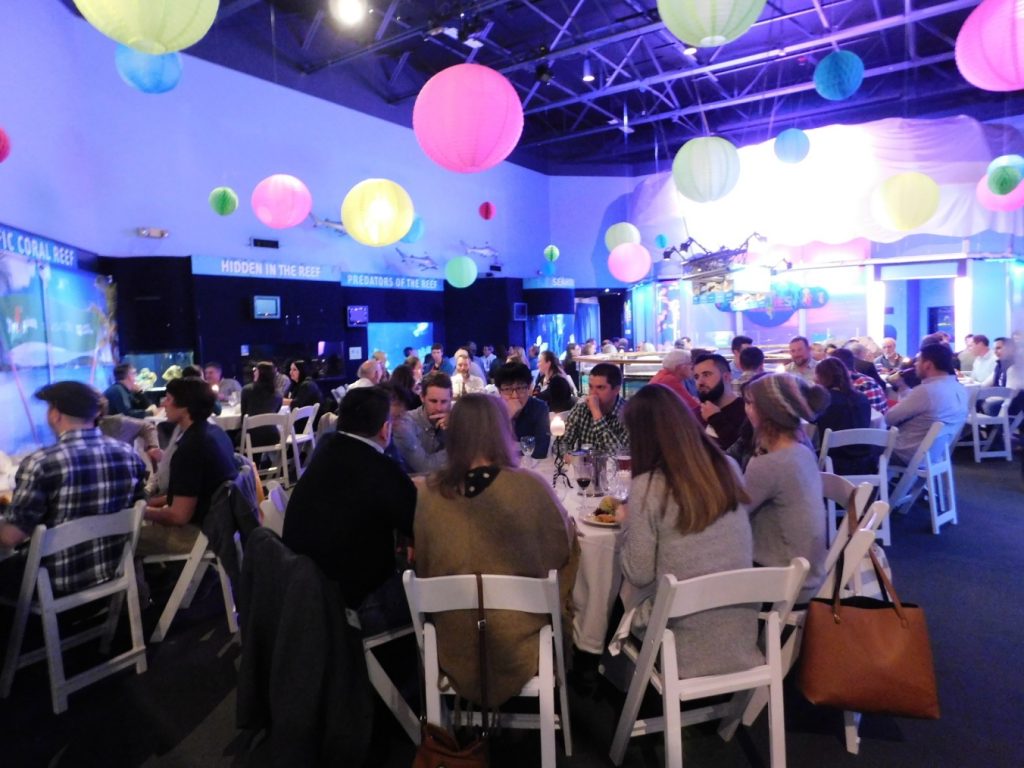The Summer SNEC meeting will be somewhere in Rhode Island during the month of June.
Category: Meetings
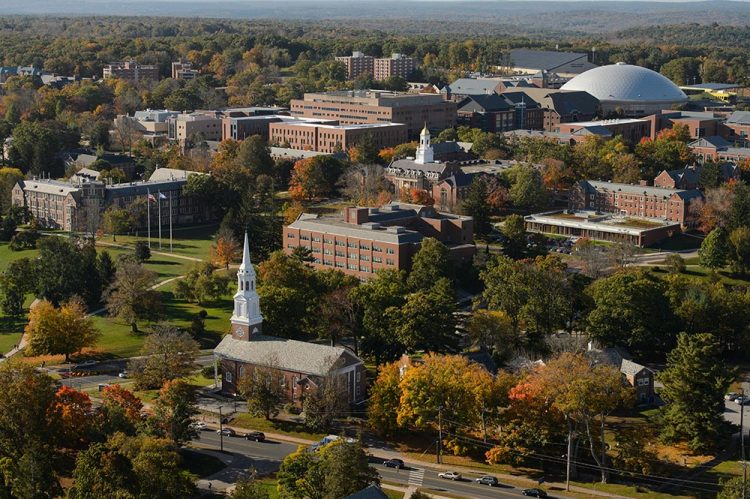
AFS SNEC Winter 2024 Science Meeting Program
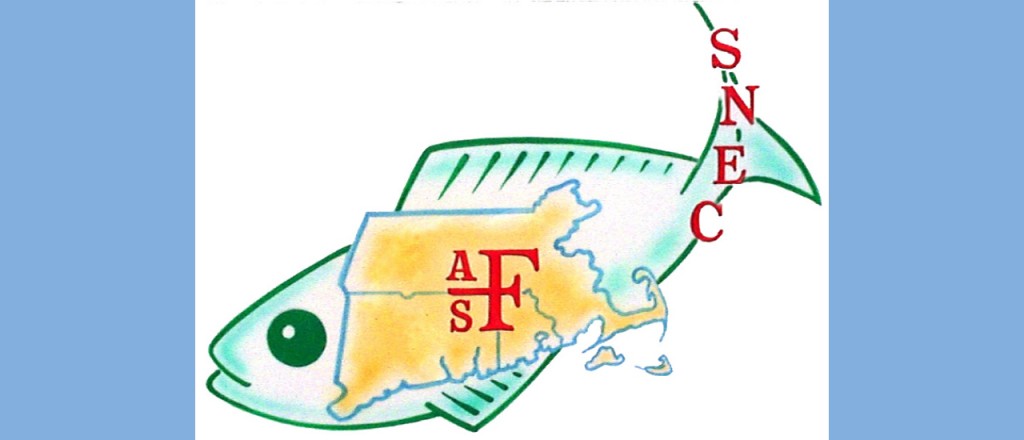
A pdf of the program with abstracts can be downloaded here, and the text version of just the schedule is below.
SCHEDULE
8:30 – 9:00 Registration and Coffee
9:00 – 9:10 Opening Comments. Corinne Truesdale, President
9:10-9:25 Ontogeny of schooling in larval Atlantic Silversides reared under ocean acidification conditions.* Mouland, Matthew E.P., Max D. Zavell, Jacqueline F. Webb, and Hannes Baumann.
9:25-9:40 Diet and maternal investment affect larval rockfish condition and survival.* Walsh, Kamran A., Andrew R.Thompson, Garfield Kwan, Brice X. Semmens, H. Will. Fennie, and Rasmus Swalethorp.
9:40-9:55 Variation in fecundity of Winter Flounder, Pseudopleuronectes americanus, and Yellowtail Flounder, Limanda ferruginea: patterns across stocks over ten years. Wuenschel, Mark J., Emilee Tholke, Yvonna Press, W. David McElroy, and Richard S. McBride.
9:55-10:10 Where did the Smallmouth Bass go? Bade, Andrew P., Spencer M. Mallette, and Christopher P. McDowell.
10:10-10:25 CT-DEEP update on Candlewood Lake Grass Carp and vegetation management efforts. Cassone, Joseph and Andrew Bade.
10:25-10:50 Break
10:50-11:05 Energy content of major prey species of Atlantic Salmon (Salmo salar) in the Northwest Atlantic as determined by proximate composition analysis. Hobbs, Ethan, Ken Oliveira, Mark Wuenschel, and Tim Sheehan.
11:05-11:20 Characterizing outmigration patterns and downstream passage of landlocked Atlantic Salmon in the Winooski River, Vermont. Heisey, Aaron, Theodore Castro-Santos, Jonah Withers, Kurt Heim, Laurie Earley, and William Ardren.
11:20-11:35 Investigating the size and spawning history of river herring within the Connecticut River over the past decade.* Stephens, Jacqueline, Allison Roy, Adrian Jordaan, Dave Perkins, and Kenneth Sprankle.
11:35-11:50 Comparing juvenile river herring growth and density in freshwater lakes and associated estuaries.* Burgoff, Julian, Allison Roy, and Adrian Jordaan.
11:50-12:05 Is drought the new fad diet? Effect of entrapment on size, body condition, and growth rates of juvenile anadromous alewives.* Burgess, Michael, Katherine King, Ryan Adams, Eric Schultz, and James Knighton.
12:05-13:35 Lunch and Posters
13:35-13:50 Oyster health and restoration in Long Island Sound. Mayo, Isaiah M., Mariah Kachmar, Genevieve Bernatchez, Mark Dixon, LTJG Tyler Houck, Meghana Parikh, and Katie McFarland.
13:50-14:05 A numerical investigation of size selectivity in a modified scallop dredge.* Cowles, Geoff and Sean Boisvert.
14:05-14:20 Using AIS data and machine learning to improve estimates of development exposure for the scallop fishery in Southern New England.* Livermore, Julia.
14:20-14:35 American Lobster and Jonah Crab populations inside and outside the Northeast Canyons and Seamounts Marine National Monument, USA. Arnott, Stephen A., Michael P. Long, Aubrey Ellertson, and N. David Bethoney.
14:35-15:00 Break
15:00-15:15 Investigating the utility of complementary fixed and random stratified sampling to track marine fish and invertebrate abundance trends . McManus, M. Conor, Chris J. Parkins, and Scott D. Olszewski.
15:15-15:30 Unwrapping the natal origins of coastal Striped Bass. Gahagan, Ben, Nathalie LeBlanc, Scott Pavey, P. Adrian Jordaan, Eric Anderson, and Andrew Whiteley.
15:30-15:45 Accounting for avoidance behavior in fishery catch rates of Atlantic Cod.* Grezlik, Max and Steve Cadrin.
15:45-16:00 Prototype management strategy evaluation for ecosystem-based fisheries management in New England. Guyant, Madeline, Gavin Fay, Lisa Kerr, Emily Liljestrand, Jerelle Jesse, Andrew Applegate, John Pappalardo, and Samuel Truesdell.
16:30-18:00 Social at Graduate Hotel
* Denotes student paper
Presenter name is underlined
Posters
P1 Maternal mercury transfer from pregnant Spiny Dogfish (Squalus acanthias) to their pups through ovoviviparous reproduction.** Ajemian, Maxwell R. and David Taylor.
P2 Chemical analysis of plastics particles in an estuary (Thames River, CT) and the digestive system of seabirds (Tasmania, Australia).** Beauchemin, Elise, Mikasa Lierman, Sadie Olson, Sarah Skurat, Cheyenne Waters, Dr. Karina Mrakovcich, and Dr. Deanna Bergondo.
P3 Engaging the fishing community to understand disease and reproductive dynamics of the Atlantic Sea Scallop. Brander, Douglas, N. David Bethony, Anna Mercer, and George Maynard.
P4 Ontogenetic effects of harmful algal blooms and ocean acidification on the Artemia spp.** Candia, Joseph, Christopher J.Gobler, and Konstantine J.Rountos.
P5 Investigating the diet of endangered sturgeon in the Connecticut River using gastric lavage and eDNA metabarcoding techniques.** Kraczkowski, Michelle, Loren Tardif, and Jacqueline Benway.
P6 Using fine-scale fishery data to estimate economic impact of wind farms on the Summer Flounder fishery. Marjadi, Meghna N., Anna J. Mercer, Andrew W. Jones, and Steven X. Cadrin.
P7 Pilot hook and line survey for data continuity in wind energy areas. Mercer, Anna, Dave McElroy, and Katie Viducic.
P8 Kokanee in Connecticut; the past, present and future. Ransom, Andrew and Brian Eltz.
P9 Pilot observer program for Rhode Island state waters gillnet fishery. Remick, Abrielle and Nicole Lengyel Costa.
P10 Launching an expert elicitation exercise to develop a comparative framework of synergies and tradeoffs from a suite of decarbonization solutions on fishery ecosystems.** Sedore, Vanessa and Sarah Schumann.
P11 Population dynamics and competitive interactions of Channel Catfish in Connecticut lakes and ponds. Shubat, Danielle and Ryan Adams.
P12 Terrestrial predator visitation patterns at riverscape cold-water thermal refuges.** Sullivan, Christopher J., Chadwick D. Rittenhouse, and Jason C. Vokoun.
P13 How does adaptation to local conditions affect the ability of gene flow to help widespread species adapt to changing climates along a latitudinal gradient? Wasserman, Ben A. and Mark C. Urban.
P14 Overwintering growth and lipid accumulation in northern stock Black Sea Bass (Centropristis striata) juveniles.** Zavell, Max D., Matthew E.P. Mouland, Eric Schultz, and Hannes Baumann.
P15 New SNEC Logo Ballot
**Denotes student poster
Presenter name is underlined
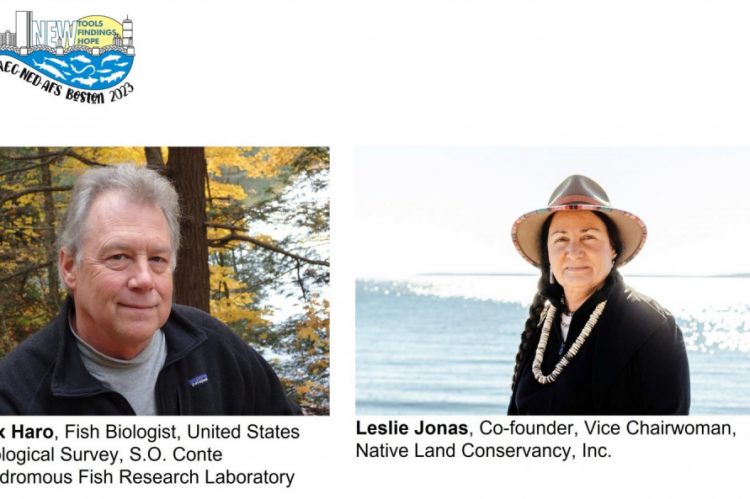

Winter 2024 SNEC Meeting
The Southern New England Chapter AFS Winter meeting will take place on Tuesday January 9, 2024
at the University of Connecticut Storrs Campus.
Registration is OPEN at https://snec.fisheries.org/meetings/meeting-registration/
Pre-registration will close on Friday 12/29/23.
Abstract submission is CLOSED.
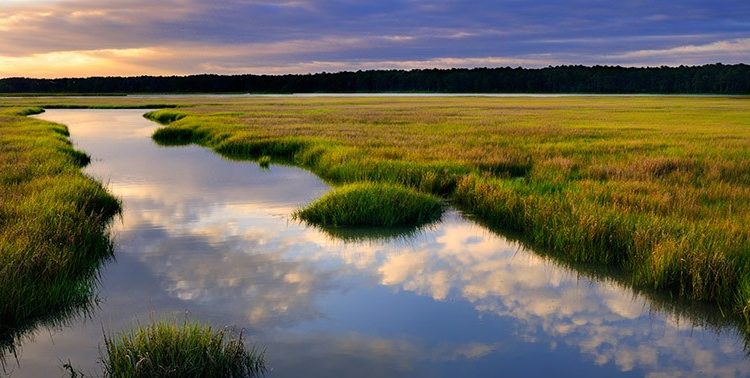
Summer Meeting Success!
SNEC held the Summer meeting via Zoom with 9 talks and a keynote speaker. Check out the program here. We look forward to an in-person meeting in 2022.
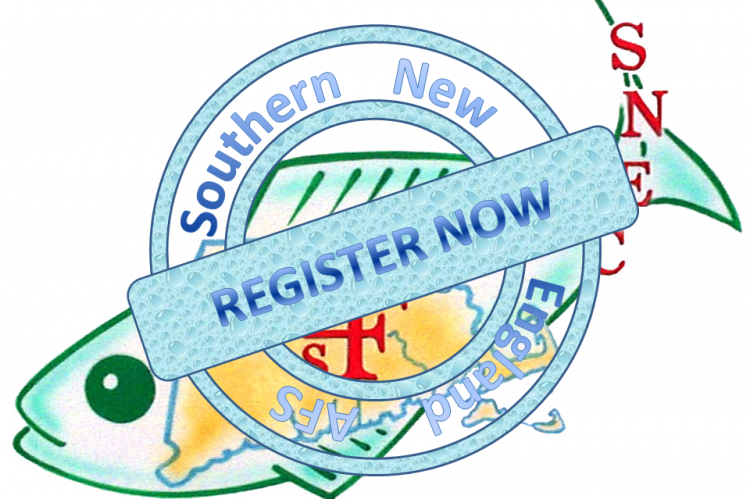
Registration for Virtual 2021 Summer Meeting
Registration is now OPEN. We look forward to seeing you on Zoom on June 28, 2021!
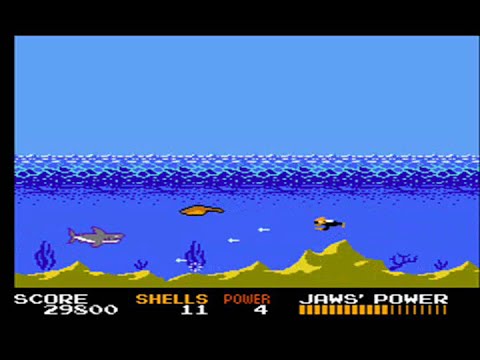
Call for Abstracts for the 2021 Virtual Winter Meeting
The SNEC Winter meeting is going virtual! January 11-12. Abstracts are due by Friday, December 4th and can be submitted HERE

January 12-14, 2020 SNEC Winter Meeting Information
AFS SNEC is holding a multi-day science meeting on January 12-14th in Cambridge, Massachusetts.
Online registration is now CLOSED. Walk in registration rates now apply.

The program is now available! HERE
The abstracts are available HERE
The meeting will feature four workshop options, two keynote speakers, four symposia, student activities, and contributed papers (oral & posters). Included with the price of 2 day admission is a banquet at the New England Aquarium.
The two keynote speakers include: Dr. John Farrell from SUNY College of Environmental Science and Forestry talking about “Longitudinal Studies & Research on the St. Lawrence River: Ecological Change, Habitat, & Fisheries“, and Dr. Lisa Kerr from Gulf of Maine Research Institute will speak about “Climate Challenges to Fisheries Management in a Rapidly Changing Ecosystem“.
In addition to contributed papers, four organized symposia will cover topics including:
Big Rivers
Research in Support of Sustainable Seafood
Fish as Indicators of Environmental Quality
New England Supporting Fisheries Reforms in China
Several student-focused activities will also be held, including a workshop and a student-mentor lunch. The workshop titled “Student-Professional Mixer: Preparing for Successful Recruitment as an Early Career AFS Member” is designed to connect current fisheries students with a diverse panel of professionals to exchange advice, and to give students the chance to practice their interviewing skills with people who regularly participate in the hiring process. This is a great opportunity for students to ask the important questions regarding employment in the fisheries field! For more information about student events please contact Christopher Sullivan [email protected]
Following Monday’s conference sessions, we will have a networking dinner at the New England Aquarium beginning at 6pm. Transportation from the hotel will be available.
Three workshops will be held on Sunday January 12th that are $25 for people who register for either the 2-day meeting or just 1 day and $45 for people who would like to attend JUST the workshop. Details on workshops can be found on the Workshop page. A fourth workshop is on seaweed pressing and the cost is $50.00.
A block of rooms has been made available for $125.00 per night at the Hyatt Regency. Reservations must be made using the link below. Make your reservations as soon as you can to make sure you get the special SNEC price!
https://www.hyatt.com/en-US/group-booking/BOSRC/G-SNEC
Parking at the Hyatt garage will be available for $25/car per night.
Questions? Email [email protected]
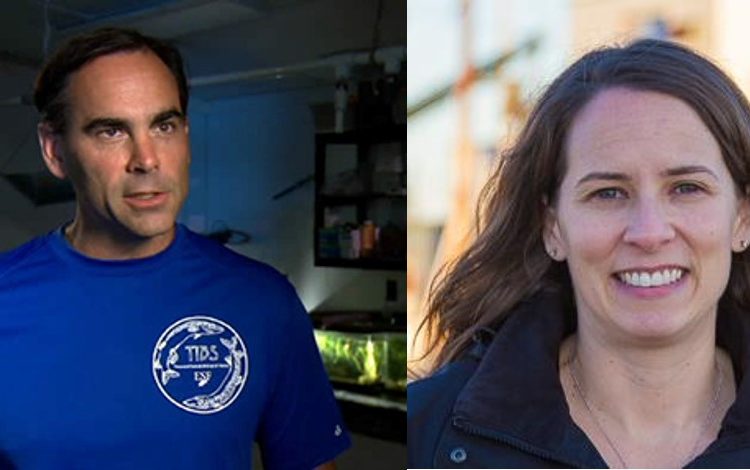
Keynote Speakers at the January 2020 Meeting
Gallery
Dr. John Farrell
SUNY College of Environmental Science and Forestry
Longitudinal Studies & Research on the St. Lawrence River: Ecological Change, Habitat, & Fisheries
Dr. Lisa Kerr
Gulf of Maine Research Institute
Climate Challenges to Fisheries Management in a Rapidly Changing Ecosystem
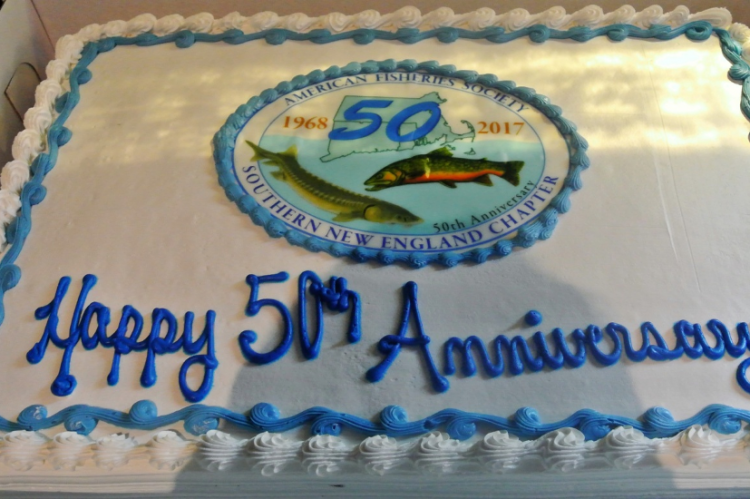
SNEC 50th Recap
For the first time in its 50-year history the Southern New England Chapter held a multi-day winter meeting and graciously did so in conjunction with the AFS Northeastern Division, creating a regional flair for the conference. The Chapter’s Golden Anniversary meeting took place during February 26-28 in Mystic, CT. The first day was devoted to two workshops and the following two days consisted of paper and poster presentations, two plenary talks, a keynote address, Chapter and Division business meetings, and various social events. Ample time was allotted for breaks and social events, which facilitated peer-to- peer communications. An off-site student-mentor lunch was also set up, allowing for professionals to give advice to future working fisheries scientists. Total attendance was 185, which included 36 students. Among the attendees were members of the AFS Governing Board, including Joe Margraf (AFS President), Ron Essig (Past President), Steve McMullin (President-Elect), Doug Austen (Executive Director), Jason Vokoun (NED President), Justin Davis (NED President-Elect), Julie Claussen (International Fisheries Section President), and Sara Turner (Emerging Leader).
Meeting workshops included “Communicating and Grant Writing for Science Professionals” presented by Rich McBride, Syma Ebbin, and Michelle Staudinger, and “Adaptive Fisheries Management” by Steve Cadrin, Katie Kennedy, and Fred Mattera. The two workshops attracted 29 participants. The Chapter would like to hold additional workshops, perhaps as soon as this coming summer. Anyone having workshop suggestions or would like to assist in their implementation should contact Bill Duffy at [email protected].
Two invited speakers gave plenary addresses, Jon Hare, Director of the NOAA Northeast Fisheries Science Center, spoke about science in support of living marine resource management in the northeastern U.S. shelf ecosystem. Ron Essig of the U.S. Fish and Wildlife Service connected significant events occurring in federal fisheries legislation over the past 50 years with each of the Chapter Presidents serving during the same time period. The keynote speaker was Julie Claussen of the Fisheries Conservation Foundation, who gave a fascinating talk on her work in Bhutan on the conservation of a large, riverine cyprinid, the Mahseer.
There were 48 oral paper presentations given in two or three concurrent sessions as well as a Chapter-record of 21 poster presentations. One-third of the oral and two-thirds of the poster presentations were made by students. Presentations included diverse subject matter in fisheries, aquatic sciences, and technology. Abstracts may be found here.
During the Chapter Business Meeting, President-Elect Eric Schultz noted that he is reluctantly resigning his position due to his increasing responsibilities at the University of Connecticut. The Chapter is therefore looking for a person to fill this slot as well as the incoming Secretary-Treasurer position, now held by Sara Turner, who will move up to President in the officer progression. Because the 2017 Business Meeting was held at this winter meeting rather than at the upcoming summer meeting, an electronic vote for the election of these two officers will be held sometime this spring. Anyone interested in being nominated for either of these two positions is urged to contact a member of the Chapter’s Board of Directors.
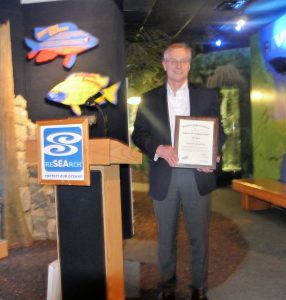
Bill Hyatt received the Chapter’s Award of Excellence for his distinguished career and achievements within the CT DEEP Bureau of Natural Resources.
Brent Schirmer, President of the UConn Student Sub-chapter reported on their activities, including plans to host a “Fishy 5K” on campus in April (with the hope that advisor Jason Vokoun will run in a fish costume). Matt Devine, President of the newly formed University of Massachusetts-Amherst Student Sub-chapter, briefly addressed business meeting attendees. This sub-unit has 21 members, including 12 undergraduates and 9 graduate students, and is advised by Dr. Adrian Jordaan. Events held so far have included “Life in the Day of a Fisheries Scientist”, which was presented to 5th grade students. The student chapter is looking forward to holding a children’s fishing derby, assisting in stream clean-ups, and hosting a fisheries science panel night on the university campus.
The Chapter’s 2017 Award of Excellence was presented to Bill Hyatt, currently the Chief of CT DEEP’s Bureau of Natural Resources, for his lifetime contributions in all fields of fisheries science, including administration, education, management, and research. Joe Pereira of NOAA Fisheries-Milford received the Irwin Alperin Outstanding Member Award for his many years as a mentor, teacher, and sponsor to students, particularly those in high school and college undergraduates. The Lesa Meng Aquatic Conservation Award was given to Paul Ducheney and Rich Murray of Holyoke Gas & Electric for advancing the knowledge of sturgeon passage at Connecticut River dams through a long-term collaborative process supportive of aquatic resource agencies goals. The Outstanding Organization Award went to the Friends of Pleasant Bay, which is an environmental organization dedicated to preserving and enhancing this biologically diverse and productive estuary, the largest on Cape Cod. Renee Mercaldo-Allen was presented a Special Achievement Award for her efforts over many years in overseeing the Steering Committee of the Flatfish Biology Conference. Lucas Nathan of the University of Connecticut won the Saul B. Saila Best Student Paper Award for his presentation at the 2016 Chapter summer meeting entitled “Evaluating the effects of culverts on fine scale genetic structuring of Brook Trout”. This was Nathan’s second such award in the last 3 years.
At the NED Business Meeting, Curt Orvis, recently retired from the USFWS, was presented the Dwight Webster Award for his career accomplishments in fish passage, which has benefitted the Northeast region and beyond. The President’s Award went to Margaret Murphy of the New York Chapter for all of her contributions to AFS over many years. John Cooper received a Meritorious Service Award for decades of support to the NED and its members. Justin Davis ascended as NED President with many thanks given to outgoing President Jason Vokoun. The
NED is currently looking for candidates for Vice President. Interested parties are encouraged to contact NED Pat President Kristen Ferry at [email protected].
One of the highlights of the meeting was the banquet held in the nearby Mystic Aquarium, where attendees were able to view fish and other aquatic animals from all over the world before and during dinner. And, we had a SNEC 50th anniversary cake to cap off the celebration! It appears that the multi-day meeting was very well received by all and similar meetings in the future may be considered by the Chapter.

